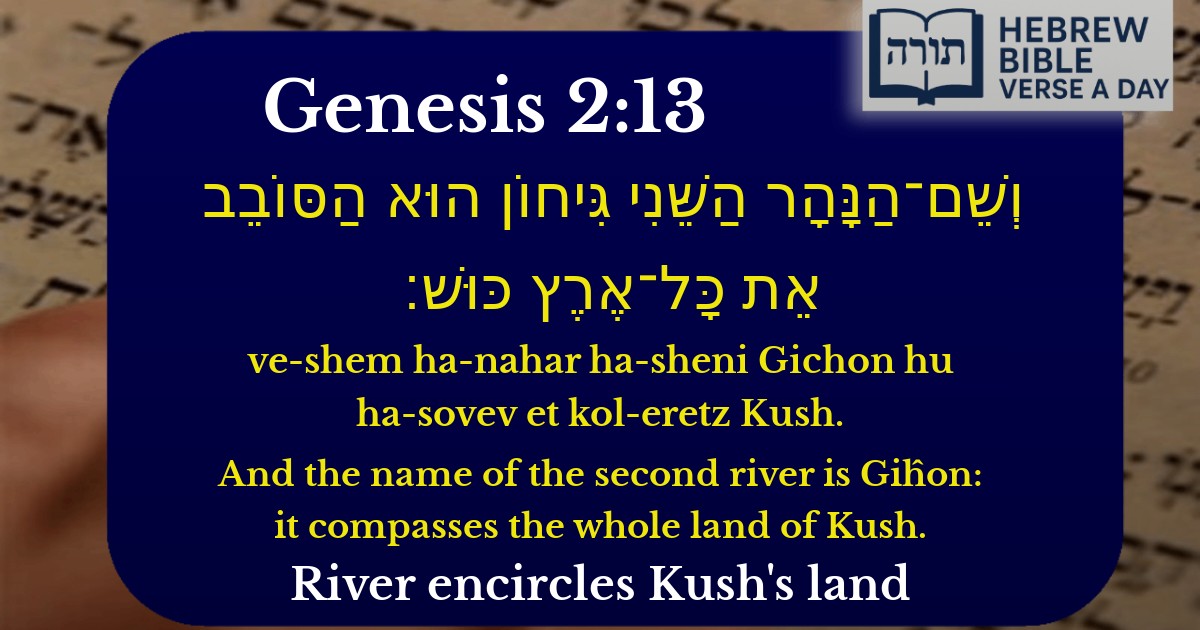Frequently Asked Questions
Q: What is the significance of the river Gichon mentioned in Genesis 2:13?
A: The river Gichon is one of the four rivers that flowed from the Garden of Eden. According to Rashi, it is identified with the Nile River, which surrounds the land of Cush (Ethiopia). This shows the vastness and richness of the lands connected to Eden in the Torah's narrative.
Q: Why does the Torah mention the river Gichon surrounding the land of Cush?
A: The Torah specifies that Gichon surrounds Cush to highlight the geographical boundaries of ancient lands. Ramban explains that this detail helps us understand the layout of the world in early times and shows how the Garden of Eden was connected to known regions, emphasizing the Torah's historical accuracy.
Q: What can we learn from the description of the rivers in Genesis 2:10-14?
A: The detailed description of the rivers, including Gichon, teaches us about the precision of Hashem's creation. The Midrash (Bereishit Rabbah) notes that these rivers symbolize the flow of wisdom and sustenance from Eden to the world, reminding us of the divine source of all blessings.
Q: Is the land of Cush the same as modern-day Ethiopia?
A: Traditional Jewish sources, like Rashi and the Talmud (Taanit 9b), identify Cush with the region of Ethiopia or nearby areas. However, the exact boundaries may differ from modern geography, as the Torah refers to ancient kingdoms and territories.
Q: How does the mention of Gichon apply to us today?
A: While we may not know the exact modern location of Gichon, the verse reminds us of the interconnectedness of creation and Hashem's providence over all lands. The Talmud (Chullin 18b) teaches that reflecting on creation deepens our appreciation for the world and our responsibility to care for it.


The River Gichon and Its Significance
The verse describes the second river emerging from Eden as Gichon, which encircles the land of Kush. Rashi (Bereshit 2:13) explains that Gichon is so named because it "gushes forth" (from the root גיח, meaning to burst or flow strongly). This river is associated with vitality and abundance, as it sustains the land of Kush.
The Land of Kush in Jewish Tradition
Kush is traditionally identified as Ethiopia or a region in Africa. The Talmud (Yoma 10a) discusses Kush in relation to its distance from Eretz Yisrael, noting its distinctiveness. Rambam (Hilchot Melachim 8:10) mentions that the inhabitants of Kush were known for their dark skin, emphasizing the diversity of human creation.
Symbolism of Gichon
Midrash Tanchuma (Kedoshim 10) connects Gichon to the future redemption, suggesting that just as Gichon flows powerfully, so too will the geulah (redemption) come with strength. The Zohar (Bereshit 27a) further associates Gichon with divine blessing, as it nourishes distant lands, symbolizing Hashem's providence extending to all corners of the world.
Geographical Interpretations